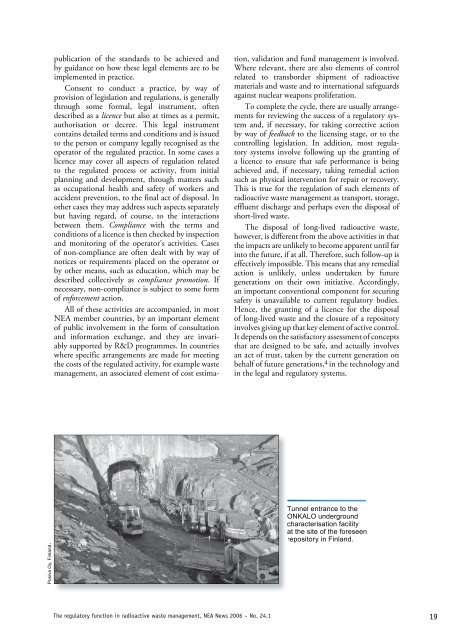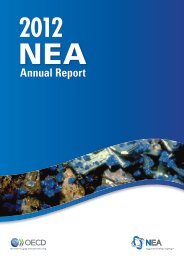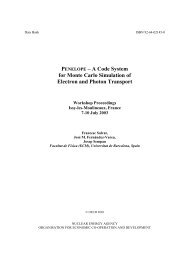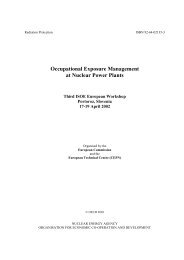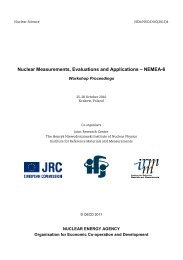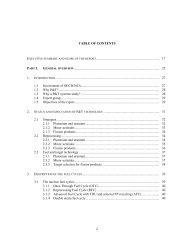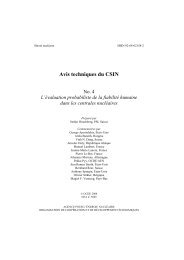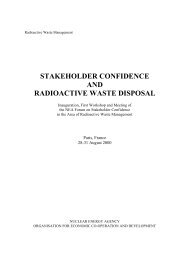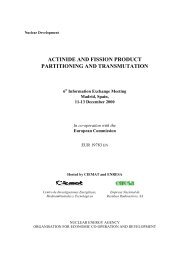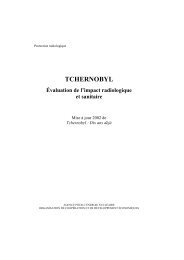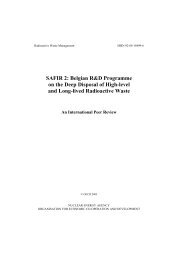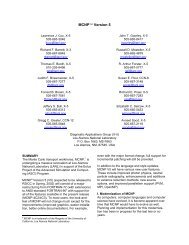The regulatory function in radioactive waste management
The regulatory function in radioactive waste management
The regulatory function in radioactive waste management
You also want an ePaper? Increase the reach of your titles
YUMPU automatically turns print PDFs into web optimized ePapers that Google loves.
publication of the standards to be achieved and<br />
by guidance on how these legal elements are to be<br />
implemented <strong>in</strong> practice.<br />
Consent to conduct a practice, by way of<br />
provision of legislation and regulations, is generally<br />
through some formal, legal <strong>in</strong>strument, often<br />
described as a licence but also at times as a permit,<br />
authorisation or decree. This legal <strong>in</strong>strument<br />
conta<strong>in</strong>s detailed terms and conditions and is issued<br />
to the person or company legally recognised as the<br />
operator of the regulated practice. In some cases a<br />
licence may cover all aspects of regulation related<br />
to the regulated process or activity, from <strong>in</strong>itial<br />
plann<strong>in</strong>g and development, through matters such<br />
as occupational health and safety of workers and<br />
accident prevention, to the f<strong>in</strong>al act of disposal. In<br />
other cases they may address such aspects separately<br />
but hav<strong>in</strong>g regard, of course, to the <strong>in</strong>teractions<br />
between them. Compliance with the terms and<br />
conditions of a licence is then checked by <strong>in</strong>spection<br />
and monitor<strong>in</strong>g of the operator’s activities. Cases<br />
of non-compliance are often dealt with by way of<br />
notices or requirements placed on the operator or<br />
by other means, such as education, which may be<br />
described collectively as compliance promotion. If<br />
necessary, non-compliance is subject to some form<br />
of enforcement action.<br />
All of these activities are accompanied, <strong>in</strong> most<br />
NEA member countries, by an important element<br />
of public <strong>in</strong>volvement <strong>in</strong> the form of consultation<br />
and <strong>in</strong>formation exchange, and they are <strong>in</strong>variably<br />
supported by R&D programmes. In countries<br />
where specific arrangements are made for meet<strong>in</strong>g<br />
the costs of the regulated activity, for example <strong>waste</strong><br />
<strong>management</strong>, an associated element of cost estimation,<br />
validation and fund <strong>management</strong> is <strong>in</strong>volved.<br />
Where relevant, there are also elements of control<br />
related to transborder shipment of <strong>radioactive</strong><br />
materials and <strong>waste</strong> and to <strong>in</strong>ternational safeguards<br />
aga<strong>in</strong>st nuclear weapons proliferation.<br />
To complete the cycle, there are usually arrangements<br />
for review<strong>in</strong>g the success of a <strong>regulatory</strong> system<br />
and, if necessary, for tak<strong>in</strong>g corrective action<br />
by way of feedback to the licens<strong>in</strong>g stage, or to the<br />
controll<strong>in</strong>g legislation. In addition, most <strong>regulatory</strong><br />
systems <strong>in</strong>volve follow<strong>in</strong>g up the grant<strong>in</strong>g of<br />
a licence to ensure that safe performance is be<strong>in</strong>g<br />
achieved and, if necessary, tak<strong>in</strong>g remedial action<br />
such as physical <strong>in</strong>tervention for repair or recovery.<br />
This is true for the regulation of such elements of<br />
<strong>radioactive</strong> <strong>waste</strong> <strong>management</strong> as transport, storage,<br />
effluent discharge and perhaps even the disposal of<br />
short-lived <strong>waste</strong>.<br />
<strong>The</strong> disposal of long-lived <strong>radioactive</strong> <strong>waste</strong>,<br />
however, is different from the above activities <strong>in</strong> that<br />
the impacts are unlikely to become apparent until far<br />
<strong>in</strong>to the future, if at all. <strong>The</strong>refore, such follow-up is<br />
effectively impossible. This means that any remedial<br />
action is unlikely, unless undertaken by future<br />
generations on their own <strong>in</strong>itiative. Accord<strong>in</strong>gly,<br />
an important conventional component for secur<strong>in</strong>g<br />
safety is unavailable to current <strong>regulatory</strong> bodies.<br />
Hence, the grant<strong>in</strong>g of a licence for the disposal<br />
of long-lived <strong>waste</strong> and the closure of a repository<br />
<strong>in</strong>volves giv<strong>in</strong>g up that key element of active control.<br />
It depends on the satisfactory assessment of concepts<br />
that are designed to be safe, and actually <strong>in</strong>volves<br />
an act of trust, taken by the current generation on<br />
behalf of future generations, 4 <strong>in</strong> the technology and<br />
<strong>in</strong> the legal and <strong>regulatory</strong> systems.<br />
Posiva Oy, F<strong>in</strong>land.<br />
Tunnel entrance to the<br />
ONKALO underground<br />
characterisation facility<br />
at the site of the foreseen<br />
repository <strong>in</strong> F<strong>in</strong>land.<br />
<strong>The</strong> <strong>regulatory</strong> <strong>function</strong> <strong>in</strong> <strong>radioactive</strong> <strong>waste</strong> <strong>management</strong>, NEA News 2006 – No. 24.1<br />
19


